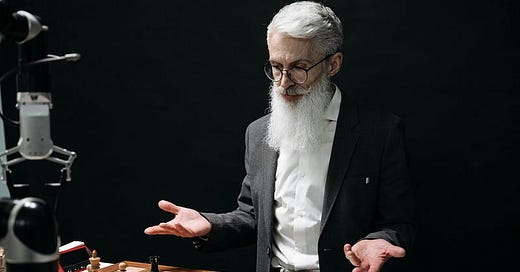Are the World Health Organization and Cancer Institutes Wrong? Why Alcohol Lovers Might Have a Point!
Some People Without Scientific Background Criticize Experts, Dismissing Ethanol's Well-Documented, Consensus-Based Carcinogenic Effects as “Ridiculous.”
I published a version of this story on Medium and my website for further awareness.

My aim in this story is not to alarm but to raise awareness so readers can make well-informed decisions about their health.
I do not write about a topic lacking importance or evidence, or I have no experience. However, when an issue meets these standards, I aim to provide a clear view and inspire action.
Today, allocating my precious Sunday afternoon, I revisited a topic that received some criticism. My purpose was not to address criticism but to genuinely manage concerns for those affected by alcohol—a topic I have covered in detail before and will not repeat here.
In this story, I will focus on a single crucial aspect: cancer. It is a deeply challenging condition that tests our intelligence and resilience, making it essential to address any risks associated with it rather than dismissing them as trivial.
Recently, I published an article titled Why No Amount of Alcohol Use Can Be Considered Entirely Safe for Health. While many readers across platforms expressed appreciation, a few responded by criticizing the story, calling it ‘ridiculous’ and undermining the extensive research of the World Health Organization to date, as well as other prominent ones, blaming them for alarming the public.
I want to clarify that I have studied the effects of ethanol on the brain for years and have compiled a comprehensive review of the literature, which I will outline in another story with nuances.
I welcome constructive criticism and differing viewpoints. They inspire me to research more and communicate better. However, I am concerned about instances where my points were taken out of context, leading to speculative claims and unfair judgments toward reputable sources like the World Health Organization, the National Cancer Institute, and the National Institute on Alcohol Abuse and Alcoholism, as well as respected scientists and medical practitioners. This reminds me of similar responses seen years ago regarding the health risks of smoking.
It is understandable why many people feel uneasy or dismissive about such findings. Alcohol has embedded itself deeply in cultural, social, and personal rituals worldwide. It is how we toast celebrations, unwind after work, and connect with friends and family.
To be told that even moderate drinking could have severe health implications might sound extreme or even threatening to the lifestyles we embraced and passed down.
Before diving into the scientific aspects, I’d like to point out that, unlike essentials like food, sleep, exercise, or rest, alcohol is not a requirement for our survival or well-being. It is a substance humans learned to create through farming, such as fermenting grapes and other crops. For millions of years, our ancestors thrived without it.
This anthropological fact highlights that our genes did not evolve in the presence of alcohol, so the notion of our biology being naturally adapted to it is not well-supported. Current scientific understanding doesn’t suggest alcohol as inherently beneficial to health, and any claims suggesting otherwise should be carefully evaluated against established evidence.
The hypothesis that resveratrol in red wine offers health benefits has been increasingly questioned, with clinical studies providing limited support. Recent research published in prestigious journals like Nature suggests that even doses of resveratrol, many times higher than those found in red wine, may not deliver the anticipated health benefits.
I have no personal bias against red wine. In fact, it holds nostalgic value for me, as my Mediterranean grandparents cultivated grapevines and produced red wine. Their efforts helped sustain their livelihood and contributed to supporting my parents’ education.
I also have no personal attachment or philosophical or religious bias against alcohol and respect those who can tolerate it without adverse effects. This story is not about those who drink responsibly; it is about the broader public health risks associated with harmful alcohol consumption. My focus is on those who are at high risk and those who cannot tolerate it.
After these personal disclaimers, I want to highlight a few key points. In recent years, major health organizations like the World Health Organization (WHO) and the National Cancer Institute (NCI) have consistently warned the public about the carcinogenic effects of alcohol.
They highlight studies connecting ethanol — alcohol’s main component — to cancer risks, even in moderate consumption. Yet, despite the overwhelming research, a vocal subset of people insists that these warnings are overblown, and some even go as far as labeling the scientists behind these studies as “ridiculous.” I respect their opinions, but I don’t want high-risk people to ignore evidence and warnings from authorities.
Skeptics Who Resist vs. Scientists Who Care
Keep reading with a 7-day free trial
Subscribe to ILLUMINATION Health & Wellness Network to keep reading this post and get 7 days of free access to the full post archives.



